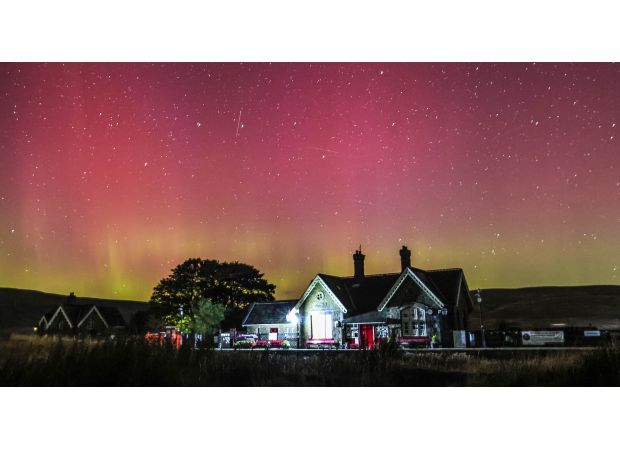Will the stunning aurora borealis make another appearance in the UK's skies tonight?
Opportunity for those who missed the aurora to see it again.

Tonight, the sky above Ribblehead Train Station is expected to light up with the breathtaking display of the Northern Lights, also known as the Aurora Borealis. And for those living in the UK, this could be another chance to witness this natural phenomenon, thanks to ongoing magnetic disturbances which have pushed the lights further south than usual.
The Met Office recently announced on X that the aurora could be visible tonight, urging people to keep their eyes peeled for the dazzling lights. With clear skies expected, the conditions are perfect for catching a glimpse of the aurora in Scotland, Northern Ireland, and even as far south as northern England. The best time to spot them is between 11pm and 5am, according to the Met Office.
Last night, stargazers across the country were treated to the stunning sight of the Northern Lights after the announcement. And for those who missed out, there's good news - there's another opportunity to see them tonight. The Met Office has issued an alert that the aurora may be visible in northern areas of the UK, primarily in Scotland, overnight Friday into Saturday.
But where exactly can you see the lights tonight? According to the Met Office, the aurora may be visible as far south as northern England and even in some coastal areas of North Wales and Norfolk. However, visibility is expected to fade overnight. So for the best chances of spotting the Northern Lights, head to Scotland.
This year, the Northern Lights have made a few appearances already, with stargazers across the country marveling at their beauty. In May, they were visible for the first time in 20 years, thanks to a huge solar storm that hit the Earth. This enhanced solar activity resulted in a brighter and more vibrant aurora, which could even be seen over London's bright city lights.
If you're hoping to capture the Northern Lights in all their glory, you'll need some special techniques and equipment. A DSLR or mirrorless camera with a wide-angle lens is recommended, as it allows more light to enter and capture the lights in the dark sky. And don't forget to use a tripod to keep your camera steady for those long exposure shots.
While some newer smartphones do have features like 'Night Mode' or manual settings for adjusting exposure, they may not be able to capture the Northern Lights as vividly as a dedicated camera. However, in ideal conditions, you may still be able to snap a decent photo of the aurora with your phone. So keep your camera or phone ready, and who knows - you may just be able to capture the magical Northern Lights tonight.




